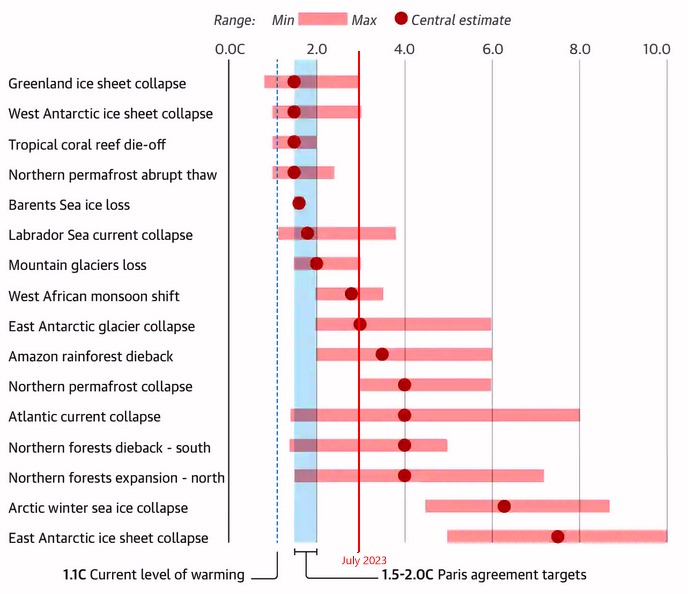
Modified from "Exceeding 1.5℃ global warming could trigger multiple climate tipping points" (Sept. 2022). The red line marked "July 2023" shows some of the multiple tipping points crossed and feedback loops created in the summer of 2023.
By Daniel Brouse
July 8, 2023
How long is “ever”… as in “the hottest it’s ever been in recorded history”?
During the first week of July 2023, the Earth had the hottest days ever.
Humans are about 200,000 years old with our closest variety being dated to about 140,000 years ago. The earliest “recording of history” is approximately 100,000 years old. It is the story of The Seven Sisters of The Pleiades. The Seven Sister are a cluster of stars in the Taurus constellation. There are six stars visible to the naked eye. The story is about seven stars. The seventh star has not been visible to the naked eye for over 100,000 years.
The 20th-century surface temperature average for Earth was 13.9℃.
In the first weeks of July of 2023, the average temperature was 17℃.
Q: Is it possible for humans to push the temperature 3℃ above pre-industrial levels?
A: Yes. Humans have pushed global temperatures up more than 3℃.
Q: Is it possible for humans to survive at temperatures greater than 3℃?
A: Probably not long. Humans have never done it before.
Extreme weather will become more frequent and intense. Sea levels will rapidly rise as the coasts disappear. However, the most concerning development will be feedback loops and tipping points. Plants will become extinct and many carbon sinks will vanish. The Earth’s temperature will continue to accelerate at an exponential rate no matter what humans do. Food, fresh water, and breathable air will cease to exist. Humans will likely follow in short order.
These "tipping points" were preventable; however, now they are becoming inevitable. Climate scientists had thought we would not cross tipping points for centuries at the earliest. Tipping points are part of feedback loop systems. A tipping point occurs when a human influenced global warming activity becomes self-sustaining without the human activity. For instance, the mountain glacier loss tipping point has triggered a feedback loop. The ice-albedo feedback loop is an expression of the ability of surfaces to reflect sunlight (heat from the sun). Any loss of ice over a darker surface means the surface will absorb more heat and reflect less heat. This process makes the Earth warmer causing more loss of ice... which in turn causes more warming of the Earth. When a tipping point causes another tipping point to be toppled it is called the The Domino Effect. Mountain glacier loss, the collapse of AMOC, and the dieback of the Amazon rainforest is an example of The Domino Effect.
“The increasing heating of our planet caused by fossil fuel use is not unexpected, it was predicted already in the 19th century after all,” said climate scientist Stefan Rahmstorf at the Potsdam Institute for Climate Research in Germany. “But it is dangerous for us humans and for the ecosystems we depend on. We need to stop it fast.”
This is our current situation. Not “years away”. Not tomorrow. Today.
Stop burning fossil fuels today, stop exploiting hydrocarbons today, or else….
UPDATE
September 6, 2023
"Climate breakdown has begun," the United Nations Secretary-General Antonio Guterres warned the world after the World Meteorological Organization (WMO) reported the world endure its hottest Northern Hemisphere summer in human history. "The dog days of summer are not just barking, they are biting," the UN chief said in a statement after the report's release.
"What we are observing, are not only new extremes but the persistence of these record-breaking conditions, and the impacts these have on both people and planet, are a clear consequence of the warming of the climate system," C3S's Climate Change Service Director Carlo Buontempo said.
Climate Breakdown is "the most concerning development" (as discussed above.) Climate breakdown happens when feedback loops are created and tipping points are crossed. Plants will become extinct and many carbon sinks will vanish. The Earth’s temperature will continue to accelerate at an exponential rate no matter what humans do. Food, fresh water, and breathable air will cease to exist. Humans will likely follow in short order.
UPDATE PART II
In October of 2023, the European Space Agency's Copernicus Climate Change Service calculated
that the average temperature for September was 16.38 degrees Celsius (61.48 degrees Fahrenheit) breaking the previous record set in September 2020 by a half-degree Celsius (0.9 degrees Fahrenheit).
This is the largest increase in a monthly record high ever.
"It's just mind-blowing really," said Copernicus Director Carlo Buontempo. "Never seen anything like that in any month in our records."
"This is not a fancy weather statistic. It's a death sentence for people and ecosystems. It destroys assets, infrastructure, harvest," Imperial College of London climate scientist Friederike Otto said.

* Our climate model employs chaos theory to comprehensively consider human impacts and projects a potential global average temperature increase of 9℃ above pre-industrial levels.
What Can I Do?
There are numerous actions you can take to contribute to saving the planet. Each person bears the responsibility to minimize pollution, discontinue the use of fossil fuels, reduce consumption, and foster a culture of love and care. Be a butterfly and affect the world.
The Butterfly Effect illustrates that a small change in one area can lead to significant alterations in conditions anywhere on the globe. Hence, the frequently heard statement that a butterfly in China can cause a hurricane in the Atlantic.